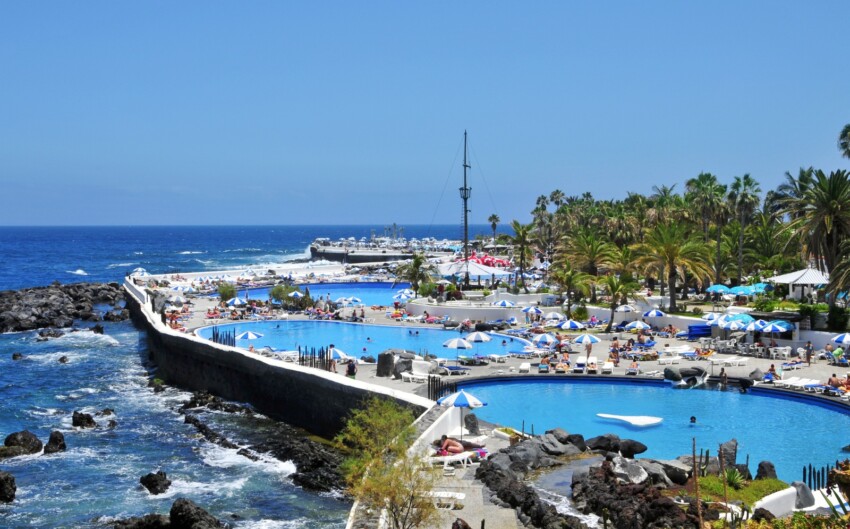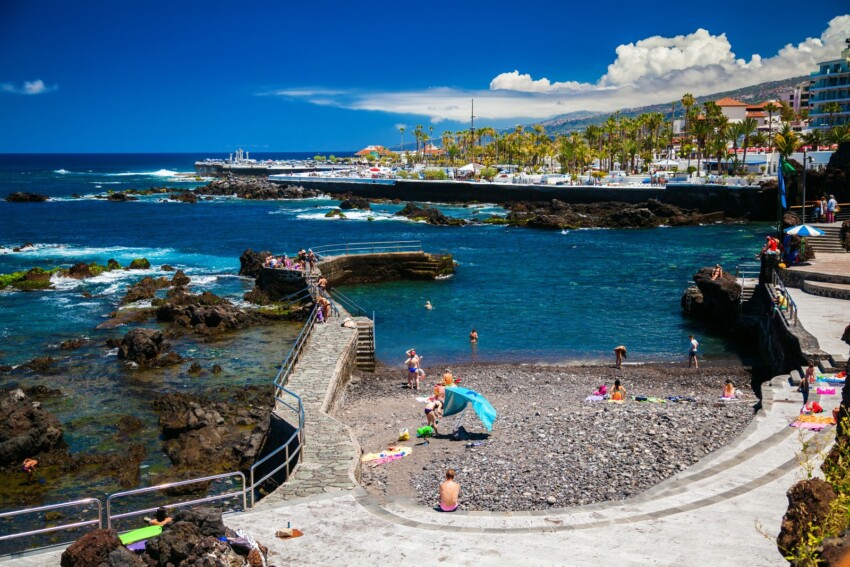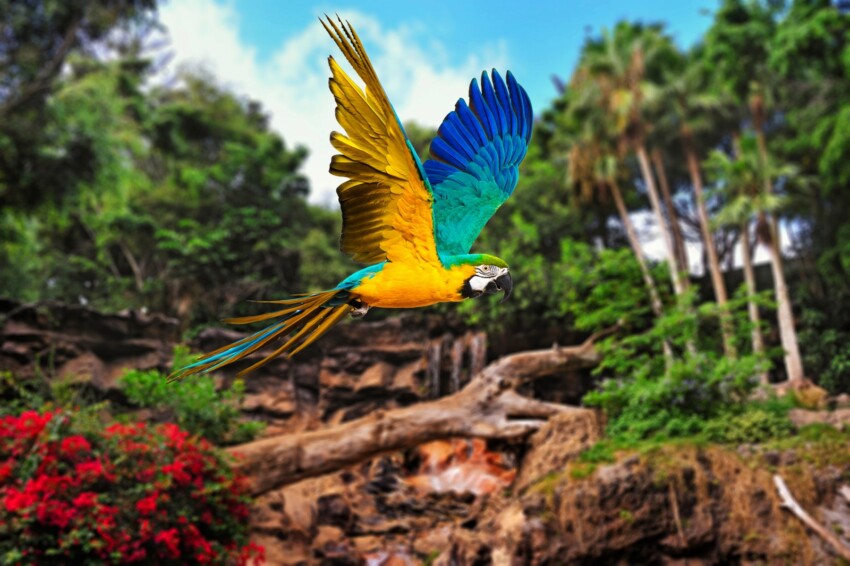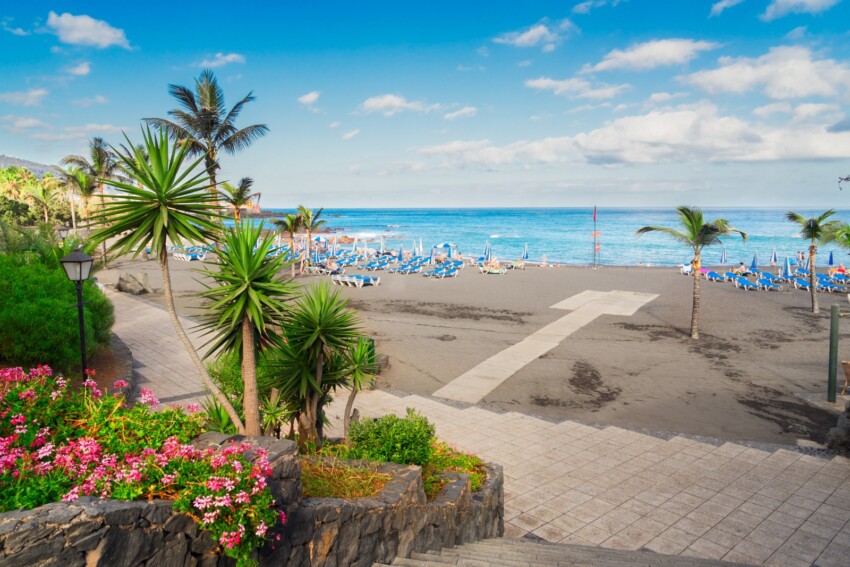

Puerto de la Cruz is located on the north coast of Tenerife. It is a popular town for tourists and has the distinction of being home to many large hotels, which is strange in the Canary Islands where accommodation is mostly flats or small pensions.
It was originally founded as a fishing village and later became the port for the neighbouring town of La Orotava. In the 17th century it developed as the most important port on the north coast of Tenerife, used to export sugar cane and wine from the nearby Valle de La Orotava.
In the course of time the town acquired a separate identity from La Orotava, and finally gained full municipal autonomy in 1808. At the end of the 19th century, British elites began to visit Puerto de la Cruz, staying in many of the old Spanish castles that had been converted into luxury hotels. After World War II, mass tourism reached Puerto Cruz, and has been the most important income of the city’s economy ever since.
One cannot visit Puerto de la Cruz without seeing Lago Martianez, a beautiful complex of crystal-clear water pools designed by the famous Lanzarote architect Cesar Manrique.
The old port area is lively and has surprisingly interesting shops hidden among many bars and bistros. It is very pleasant to sit and have a coffee and watch the ships in the harbour. You can still see the fishermen at work, pulling up their nets and arranging the fish on the harbour steps. It is the ideal place to take a stroll.
About half a kilometre west of the harbour are the town’s beautiful natural beaches. The sand is quite coarse and black, and surfing is the ideal sport to practice in these waters. The beaches are supervised by lifeguards and equipped with sunbeds, showers, toilets and bars.

Lake Martianez, also known as Lago Martianez or Martianez Pool, was inaugurated on 30 April 1977. It is a seawater pool complex with an open-air museum. The park was developed by Lanzarote artist Cesar Manrique.
Nothing in this pool is the result of fate. All the stones that can be seen have not been placed at random, but are considered architectural ornaments and come from different parts of the island.
Within the perimeter of Lago Martianez there are several pools and attractions, among them we can mention the Monumento al Mar o a las Olas, or Monument to the Sea or Waves, which represents solid, static concrete waves, and the Geyser, designed by Cesar Manrique with the idea of being a water sculpture. One can also admire Las Raíces Al Cielo, where some eucalyptus trees have been ‘planted’ upside down to show visitors parts of the trees that are often ignored.

Loro Parque is a 13.5 hectare zoo located on the outskirts of Puerto de la Cruz and accessible by a nice free train from the centre. It is home to a wide variety of animals and plants, and was conceived as a paradise for parrots. It has developed over the years into one of the biggest attractions in the Canary Islands, with over 40 million visitors.
When it opened in 1972, the park was 1.3 hectares in size and had 150 parrots. Today, its surface area has increased tenfold and is home to around 4000 parrots, the largest collection in the world, making the park one of the main references in the study and conservation of parrots worldwide.
In addition, Loro Parque has the longest shark tunnel in Europe, the largest Thai village outside Thailand, and the second largest number of orcas in Europe.
In addition to dolphins and penguins, creatures on display in the park include chimpanzees and gorillas, California sea lions, eastern otters, jaguars, tigers, iguanas, alligators and more. As for birds, the park is home to parrots, black swans, golden pheasants, Kookaburras, flamingos and pelicans.
In 1994, the Loro Parque Fundación was established to highlight the need to conserve nature and the environment. The foundation is particularly active in the conservation of the most endangered parrot species, both through captive breeding and in the wild.
The most important museum in Puerto de la Cruz is undoubtedly the Eduardo Westerdahl Museum of Contemporary Art. Located in the former Royal Customs House, it was founded in 1953 as the first museum of contemporary art in Spain and exhibits a collection of modern works by artists from the Canary Islands. Also of interest is the Archaeological Museum, which houses a large collection of indigenous artefacts, with an emphasis on ceramics.
A visit to the Batería de Santa Bárbara, an old defensive fortification built in the mid-18th century to protect the city from pirates, and the Castillo de San Felipe, a small defensive fortress built for the same purpose at the beginning of the 17th century, is also worthwhile. After being completely renovated in the late 20th century, it is now used as a venue for concerts and art exhibitions.
As far as religious architecture is concerned, in Puerto de la Cruz one can admire the Iglesia de San Francisco, the oldest building in town, built between 1599 and 1608 and connected to a Franciscan monastery not far away. Also very beautiful is the Capilla de San Telmo, built in 1780 and dedicated to the patron saint of sailors. After being partially destroyed by a flood in 1826, it was rebuilt and completely restored. Of particular note is the carved wooden framework in the Mudejar style.
There are several parks to visit in Puerto de la Cruz, the most important of which are undoubtedly the following:

Puerto de la Cruz has a beautiful coastline on which numerous beaches can be found. These are characterised by black volcanic sand and ocean waves that create ideal surfing conditions. The most popular beach is undoubtedly Playa Jardin, designed by César Manrique. Palm trees and long stretches of sand surrounded by colourful botanical gardens can be admired.
Its name, Playa Jardín, symbolises the rich and vibrant environment of flowers and plant life that enclose the beach. In addition to this, Puerto de la Cruz is also home to:
A tourist destination in Tenerife since the days when Playa de Las Americas and Los Cristianos did not yet exist, Puerto de la Cruz is very developed in terms of accommodation. Many of the accommodations are hotels, including several five-star ones, although there is no shortage of cheaper two- or three-star hotels that still provide all the necessary comforts for a relaxing and peaceful holiday.
The areas in Puerto de la Cruz of most interest to tourists are the seafront behind the Martianez pools, the city centre, the beaches of Playa Jardin and Playa Castillo and Loro Parque. In all, Puerto de la Cruz stretches along the north coast of Tenerife for a couple of kilometres, so whichever way you choose you will never be too far from the main attractions, which are easily accessible on foot or by public transport.
We offer a selection of hotels at Puerto de la Cruz to suit all categories of travellers. The most booked by tourists are the sea-facing hotels, often right on the beach. If you want to play it safe, choose one of the following: they are among the most booked hotels in Puerto de la Cruz, sorted by number of reviews.
If you prefer space, privacy and the ability to prepare your own meals to a hotel holiday, book a holiday home at Puerto de la Cruz. We recommend a few below, but in this case we advise you to book early because houses and apartments for rent at Puerto de la Cruz are in high demand.
Puerto de la Cruz is about 20 minutes away from Tenerife North Airport. Getting there from the plane is very easy because you just have to take the Autopista del Norte, the TF-5, and exit at exit 32 Puerto Cruz – Martiànez – El Rincón. The distance is about 25 kilometres and can be covered in less than 20 minutes by car, but becomes 45 minutes by public transport (bus 30 departing from the airport, with a stop in Tucán, a short walk from the city centre).
If you want to get to Puerto de la Cruz from Santa Cruz de Tenerife, the distance increases slightly, taking about 30 minutes by car along the TF-5, or one hour by bus: the line you are interested in is number 100.
Finally, if you want to get to Puerto de la Cruz from the resorts in the south of Tenerife, namely Playa de Las Americas, Los Cristianos or Costa Adeje, allow more than an hour’s drive. You can get there in two ways: travelling counter-clockwise along the TF-1 along the east coast, or clockwise along the TF-1 to Santiago del Teide, and then continuing first on the scenic TF-82, and then on the quiet TF-5 to your destination. The latter route is much shorter in terms of kilometres, but journey times are equivalent, due to the very winding TF-82 road, which will lower your average speed considerably.
What's the weather at Puerto de la Cruz? Below are the temperatures and the weather forecast at Puerto de la Cruz for the next few days.
Lying on the north coast of Tenerife, Puerto de la Cruz is 25 kilometres from thenorthern airport and 25 kilometres from Santa Cruz de Tenerife. To get to the south, for example to Los Cristianos, it takes over an hour, travelling around Teide to the east, via Santa Cruz, or to the west, via Garachico and Adeje.